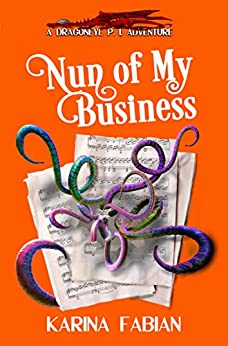Genre
Audience
13 & up
Author’s Worldview
Catholic
Year Published
2022
Themes
Reviewed by
Corinna Turner
Vern, the only dragon PI in either the Faerie or Mundane realms, is pretty skeptical when a Faerie nun hires him to investigate an apparently harmless pop song. But the more he investigates, the less certain he is that either the song—or the nun—are quite what they seem. Sister Grace is clearly traumatized, but that doesn’t mean she’s mad. But if she isn’t, why does no one else see anything suspicious about a mere piece of music—not even him?
This hilarious full-length installment in the Vern-verse gives us the back story on the beginning of Vern and Sister Grace’s detective partnership. A must-read for established fans and a great place for new readers to start.
A quick recap for new readers: Vern is a dragon living on the Mundane side of the inter-dimensional gap, a recent rip in space-time that now allows free passage between our world (the Mundane) and the Faerie version of the world (where they have magic). After losing a fight with Saint George centuries ago, Vern must serve the Faerie Church to gradually earn back his draconic powers and abilities. Which he has done ever since, his snark and draconic pride hiding a good heart.
Catholic fantasy fans are probably wriggling in their seats with glee by this point, but Vern’s adventures can be enjoyed by all, religious or secular. The faith elements simply form part of the backdrop and plot without intruding or growing at all preachy.
Despite being laugh-out-loud funny most of the way through, Nun of My Business also touches on the serious theme of PTSD and trauma. Even the strong, it is made very clear, can be overwhelmed by their demons—literal or figurative. The importance of love and support in such circumstances are made very clear. Friendship is also an important theme.
Vern’s draconic point of view allows Fabian to critique human nature in an insightful way. Vern’s frequent mystification and/or exasperation with human behavior are frequent sources of comedy, as are his own draconic habits.
The only small criticism I would make is that a couple of times Fabian introduces one of the minor characters from another book in the series without sufficient explanation as to who they are. In virtually every other respect, this book and the others in this series can be read in any order, since each stands alone.
Readers who are truly allergic to religion, or at least to Catholicism, will not like this book, since the Church and numerous members of the clergy are significant to the plot and usually portrayed positively. All other readers should find this really a fun, light, entertaining ride and may just find themselves hooked. Dragons, Faerie nuns, a mysterious song, laugh-out-loud comedy, and just the right touch of seriousness.




